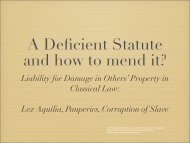The Origins and the Division thereof.
The Origins and the Division thereof.
The Origins and the Division thereof.
- No tags were found...
You also want an ePaper? Increase the reach of your titles
YUMPU automatically turns print PDFs into web optimized ePapers that Google loves.
Obligationes<strong>The</strong> <strong>Origins</strong> <strong>and</strong> <strong>the</strong> <strong>Division</strong> <strong>the</strong>reof.José Luis Alonso & Jakub Urbanik<strong>The</strong> RomanLaw of Obligation I Chair of Roman <strong>and</strong> Antique Law.University of WarsawSunday, 30 May 2010
[…] <strong>The</strong> Roman Law of obligations isindeed a great <strong>and</strong> unique achievementin <strong>the</strong> history of human civilization.Schulz, Classical Roman Law p. 463Sunday, 30 May 2010
What is an Obligation?✦✦✦G. 4.2 In personam actio est, qua agimus cum aliquo, qui nobis vel ex contractu vel exdelicto obligatus est, id est cum intendimus dare facere praestare oportere A personalaction is <strong>the</strong> one by which we sue <strong>the</strong> one, who has been obliged towards usei<strong>the</strong>r from a contract or from a delict, that is when we intend <strong>the</strong> he shallgive, do, perform.D. 44.7.3.pr. Paulus, 2. Inst.: Obligationum substantia non in eo consistit, ut aliquodcorpus nostrum aut servitutem nostram faciat, sed ut alium nobis obstringat ad d<strong>and</strong>umaliquid vel faciendum vel praest<strong>and</strong>um.<strong>The</strong> essence of obligations does not consistin that it makes some property or servitude ours, but that it binds ano<strong>the</strong>rperson to give, to do or to perform something for us.I. 3.13. pr. Obligatio est iuris vinculum, quo necessitate adstringimur alicuius solvendae reisecundum nostrae civitatis iura.Obligation is a legal tie, by which are necessarilybound to perform a certain thing according to <strong>the</strong> laws of our state.Sunday, 30 May 2010
Obligation✦ DEBT paired with RIGHT TO CLAIM IT✦ DEBTOR - CREDITOR✦ How natural is this solution?Sunday, 30 May 2010
<strong>The</strong> Genesis of an ‘Obligation’<strong>The</strong> factors in <strong>the</strong> Archaic Times:ILLICIT DEEDS (later: DELICTS/TORTS):TALION & agreements on damages/ obligation to compensate in <strong>the</strong> Law of XIITablesTable VIII 2. si membrum rup(s)it, ni cum eo pacit, talio esto. If one has maimed a limb <strong>and</strong>does not compromise with <strong>the</strong> injured person, let <strong>the</strong>re be retaliation.LICIT ACTS (later: PACTS, CONTRACTS:NEXUM, FIDUCIA (transactions by scale <strong>and</strong> bronze)actio per manus iniectionemlegisvas (vades), praes (praedes),stipulatioSunday, 30 May 2010
Sunday, 30 May 2010<strong>The</strong> Genesis contind.
Sunday, 30 May 2010<strong>The</strong> Genesis contind.
Sunday, 30 May 2010<strong>The</strong> Genesis contind.
<strong>The</strong> Genesis contind.Schulds- und Haftungs<strong>the</strong>orie: Alois von BrinzSunday, 30 May 2010
<strong>The</strong> Genesis contind.Schulds- und Haftungs<strong>the</strong>orie: Alois von BrinzDUTY versus LIABILITYSunday, 30 May 2010
<strong>The</strong> Genesis contind.Schulds- und Haftungs<strong>the</strong>orie: Alois von BrinzDUTY versus LIABILITYArguments in favour:Sunday, 30 May 2010
<strong>The</strong> Genesis contind.Schulds- und Haftungs<strong>the</strong>orie: Alois von BrinzDUTY versus LIABILITYArguments in favour:Legal anthropology/Comparative research: reineSachhaftungSunday, 30 May 2010
<strong>The</strong> Genesis contind.Schulds- und Haftungs<strong>the</strong>orie: Alois von BrinzDUTY versus LIABILITYArguments in favour:Legal anthropology/Comparative research: reineSachhaftungTraces in Roman Law? natural obligation, nexum, fiducia,vades & praedesSunday, 30 May 2010
Sourcesof <strong>the</strong> ObligationsIllicit <strong>and</strong> Licit DeedsSunday, 30 May 2010
Binomial division of <strong>the</strong> sources in <strong>the</strong>Institutions of GaiusG. 3.88: Et nunc transeamus ad obligationes. Omnis enim obligatio velex contractu nascitur vel ex delicto.And now we shall pass to obligations. Every obligation risesei<strong>the</strong>r from contract or from delict.Sunday, 30 May 2010
‘O<strong>the</strong>r figures’D. 44.7.1 pr. Gaius 2 aureorum sive rerum cottidianarum:Obligationes aut ex contractu nascuntur aut ex maleficio autproprio quodam iure ex variis causarum figurisGaius, 2 book of <strong>The</strong> Golden or Everyday Things:Obligations arise from ei<strong>the</strong>r from contract or fromwrongdoing or by some special right from various typesof causes.Sunday, 30 May 2010
G. 3.89-91:<strong>the</strong> 3 rd category foundFirst let us consider those that arise from contract. Of such <strong>the</strong>re four kinds:for an obligation by contract arises ei<strong>the</strong>r by a thing (re), by words (verbis), byletters (litteris), or by (simple) consent (consensu). A real obligation iscontracted, for instance, by conveyance on loan for consumption. such acontract takes place properly in <strong>the</strong> case of things that are reckoned byweight, number, or measure – such things as money, wine, oil, corn, bronze,silver, gold (...). 91. he too who receives what is not due to him from one whopays in error comes under a real obligation. For <strong>the</strong> condictio with <strong>the</strong> pleading‘if it appear that <strong>the</strong> defendant is bound to give’ lies against him precisely as ifhe had received <strong>the</strong> payment by way of loan (...) This sort of obligation,however, appears not to be founded on contract, because one who gives withintent to pay means to untie ra<strong>the</strong>r to tie a bound. (quia is qui solvendi animo dat,magis distrahere vult negotium quam contrahere).Sunday, 30 May 2010
G. 3.89-91:<strong>the</strong> 3 rd category foundFirst let us consider those that arise from contract. Of such <strong>the</strong>re four kinds:for an obligation by contract arises ei<strong>the</strong>r by a thing (re), by words (verbis), byletters (litteris), or by (simple) consent (consensu). A real obligation iscontracted, for instance, by conveyance on loan for consumption. such acontract takes place properly in <strong>the</strong> case of things that are reckoned byweight, number, or measure – such things as money, wine, oil, corn, bronze,silver, gold (...). 91. he too who receives what is not due to him from one whopays in error comes under a real obligation. For <strong>the</strong> condictio with <strong>the</strong> pleading‘if it appear that <strong>the</strong> defendant is bound to give’ lies against him precisely as ifhe had received <strong>the</strong> payment by way of loan (...) This sort of obligation,however, appears not to be founded on contract, because one who gives withintent to pay means to untie ra<strong>the</strong>r to tie a bound. (quia is qui solvendi animo dat,magis distrahere vult negotium quam contrahere).Sunday, 30 May 2010
<strong>The</strong> apparent contradiction in Gaiussolved:✦ Different character of <strong>the</strong> books (Institutions: ascholarly manual, Golden Things: a h<strong>and</strong>book forpractitioners)✦ Undue payment found in <strong>the</strong> InstitutionsSunday, 30 May 2010
LABEOD. 50.16.19 Ulpianus libro 11 ad Ed.: Labeo libro primo praetoris urbanidefinit, quod quaedam agantur, quaedam gerantur, quaedam contrahantur: etactum quidem generale verbum esse sive verbis, sive re quid agatur ut instipulatione vel numeratione: contractum autem ultrocitroque obligatione, quodGraeci συνάλλαγµα vocant, veluti emptionem venditionem, locationemconductionem, societatem: gestum rem significare sine verbis factam.Labeo in <strong>the</strong> first book on <strong>the</strong> edict of urban praetor defines that somethings are acted, o<strong>the</strong>r carried out, o<strong>the</strong>r contracted. And indeed‘acted’ is a general word whe<strong>the</strong>r something is acted by words orthings, like in stipulation or computation. ‘Contracted’ denotes bilateralobligation which <strong>the</strong> Greeks call synallagma, as for instance, sale orpurchase, hire or partnership. ‘Carried out’ means a thing done withoutwords.Sunday, 30 May 2010
o<strong>the</strong>r divisionsunilateral / bilateral (simultaneous -consecutive)stricti iuris bonae fideinatural obligationFor fur<strong>the</strong>r explanation see Introduction IISunday, 30 May 2010
<strong>The</strong> Content of Obligationimpossibilium nulla obligatio est!what is impossibility?Sunday, 30 May 2010
impossibilium nulla obligatio est!Marcus has made an agreement with a very decentwidow Livia, that she should perform in his comedy.On <strong>the</strong> day of <strong>the</strong> performance however Livia doesnot appear in <strong>the</strong> <strong>the</strong>atre. Can he sue her?Sunday, 30 May 2010
Sunday, 30 May 2010impossibilium nulla obligatio est!
impossibilium nulla obligatio est!✦ Material impossibility : initial/supervening [only in regards to thingsindividually defined]Sunday, 30 May 2010
impossibilium nulla obligatio est!✦ Material impossibility : initial/supervening [only in regards to thingsindividually defined]✦ Legal (illicit acts)Sunday, 30 May 2010
impossibilium nulla obligatio est!✦ Material impossibility : initial/supervening [only in regards to thingsindividually defined]✦ Legal (illicit acts)✦ MoralSunday, 30 May 2010
Sunday, 30 May 2010<strong>the</strong> content of obligation
<strong>the</strong> content of obligation✦ nemo alteri stipulari postestSunday, 30 May 2010
<strong>the</strong> content of obligation✦ nemo alteri stipulari postestSunday, 30 May 2010
<strong>the</strong> content of obligation✦ nemo alteri stipulari postest✦ A: “Do you solemnly promise togive to C 1000?Sunday, 30 May 2010
<strong>the</strong> content of obligation✦ nemo alteri stipulari postest✦ A: “Do you solemnly promise togive to C 1000?✦ B: “I do solemnly promise”.Sunday, 30 May 2010
✦ Why obligations in favour of <strong>the</strong>3 rd party are not admitted?Sunday, 30 May 2010
✦ Why obligations in favour of <strong>the</strong>3 rd party are not admitted?✦ Publius asked Aulus “Do you promise to paymy fa<strong>the</strong>r 1000 denarii?” to which heanswered “Yes, I do”. Is Aulus bound to pay?Sunday, 30 May 2010
<strong>the</strong> content of obligationprecisely defined content ofperformanceDefinable in MoneySunday, 30 May 2010
<strong>the</strong> content of obligation✦ G. 4.2 In personam actio est, qua agimus cum aliquo, qui nobis vel excontractu vel ex delicto obligatus est, id est cum intendimus dare facerepraestare oportere✦A personal action is <strong>the</strong> one by which we sue <strong>the</strong> one, whohas been obliged towards us ei<strong>the</strong>r from a contract or from adelict, that is when we intend <strong>the</strong> he shall give, do, perform.✦DARE - FACERE - PRAESTARESunday, 30 May 2010
✦ DARE: to give (transfer ofownership)✦ FACERE: to perform (in.al. to h<strong>and</strong>over possession)✦ PRAESTARE: to guarantee certaineffect.Sunday, 30 May 2010
Solidarity of Obligations✦ Active <strong>and</strong> passive solidarityCommon law: Joint <strong>and</strong> several liabilitySunday, 30 May 2010
Divisibility of obligations✦ Titius: “Centum mihi dari spondes?” -Caius: “spondeo” (Titius asks Caius:Do you solemnly promise to give me100? Caius: “I do solemnly promise” .✦Caius dies, leaving two heirs. Whathappens to <strong>the</strong> debt?✦✦Titius: “Equum Incitatum mihi darispondes?” - Caius: 'spondeo'. (Titiusasks Caius: “Do you solemnlypromise to give me <strong>the</strong> houseInitiates? Caius: “I do solemnlypromise”).Caius dies, leaving two heirs. Whathappens with <strong>the</strong> debt?Sunday, 30 May 2010
Divisibility of obligations✦ Titius: “Centum mihi dari spondes?” -Caius: “spondeo” (Titius asks Caius:Do you solemnly promise to give me100? Caius: “I do solemnly promise” .✦Caius dies, leaving two heirs. Whathappens to <strong>the</strong> debt?✦✦Titius: “Equum Incitatum mihi darispondes?” - Caius: 'spondeo'. (Titiusasks Caius: “Do you solemnlypromise to give me <strong>the</strong> houseInitiates? Caius: “I do solemnlypromise”).Caius dies, leaving two heirs. Whathappens with <strong>the</strong> debt?✦Content: DARE (transfer of ownership): Divisible (no matter whe<strong>the</strong>r itsobject is materially divisible)Sunday, 30 May 2010
Divisibility of obligations✦Caius sold to Titius <strong>the</strong> horsenamed Incitatus. Titius paidbut before <strong>the</strong> horse wash<strong>and</strong>ed over to <strong>the</strong> buyerCaius died.✦Caius sold to Titius 10 sacs ofwheat, before <strong>the</strong> wheat wash<strong>and</strong>ed over to <strong>the</strong> buyerCaius died.✦<strong>The</strong>re are two heirs. Whathappens to <strong>the</strong> debt?✦<strong>The</strong>re are two heirs. Whathappens to <strong>the</strong> debt?Sunday, 30 May 2010
Divisibility of obligations✦Caius sold to Titius <strong>the</strong> horsenamed Incitatus. Titius paidbut before <strong>the</strong> horse wash<strong>and</strong>ed over to <strong>the</strong> buyerCaius died.✦Caius sold to Titius 10 sacs ofwheat, before <strong>the</strong> wheat wash<strong>and</strong>ed over to <strong>the</strong> buyerCaius died.✦<strong>The</strong>re are two heirs. Whathappens to <strong>the</strong> debt?✦<strong>The</strong>re are two heirs. Whathappens to <strong>the</strong> debt?✦Content of <strong>the</strong> obligation: FACERE (a specified performance): Indivisible(no matter whe<strong>the</strong>r its object is materially divisible)Sunday, 30 May 2010
Obligatio: contentDaredivisibleFacereIndivisible(solidarity!)Sunday, 30 May 2010














